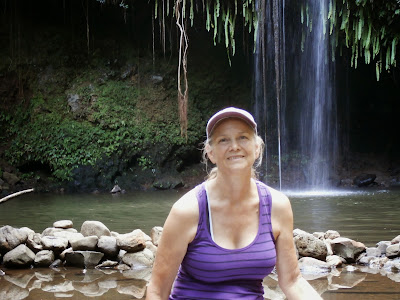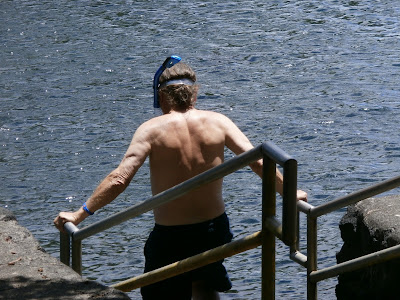In 2007 Dan and I retired from work, hitched our 5th wheel to our truck, and hit the road. We are full time RV'ers so we take our home with us everywhere we go. We live by the credo "Home Is Where You Park It" and we have found Home in many an awesome setting! I created this blog to track our adventures as we travel around the US, Canada, and Mexico. Two of our goals include visiting all the State Capitals and as many of the Baseball Parks as possible, with everything else we can fit in between!
Sunday, September 29, 2013
The Road To Hana
Legends about The Road to Hana long
preceded our actual arrival on Maui . Whenever
we mentioned our plans to stay here to the already initiated, eyebrows would
arch, heads would nod, and inevitably, in low and reverential tones, we would
be asked: "Are you going to drive The Road to Hana?" So of course, we
had to see what all the excitement was about! Also referred to as Dramamine Road Hana Highway Hana along Maui 's
rugged eastern coastline. It is hard to think of this area as unspoiled,
though, with the hundreds of tourists, including yours truly, snaking along the
620 curves, some of them of the hairpin variety, and crossing the 59 bridges,
most of which are one-laners. The drive can take anywhere from 2 to 4 hours to
complete, one way, due to the nature of the road itself, and the many opportunities to
pull off the road to experience incredible island views, flourishing
rainforests, and flowing waterfalls. The road traces a centuries-old path which
is now a well-paved highway, and despite its twists and turns, it isn't as
scary as it might seem. The speed limit is s-l-o-w, both by necessity and by
the posted signs, ranging from 10 to 25 mph in most places, and there are
guardrails the entire length of the road…not that you ever want to test them
out, if you know what I mean. We made a few stops along the drive to hike on a
nature trail, experience a waterfall up close, and just to get out and stretch
our legs. We made it to Hana in 3 hours where we had lunch and explored the area
before driving two more hours to get back home. Here are some pictures of our
journey.
Labels:
Hana,
Hawaii,
Maui,
September 2013,
The Road to Hana,
Waterfalls
Saturday, September 21, 2013
Leaving The Big Island, Heading to Maui
Today is our last day on the Big Island ,
and concludes the first month of our visit to the Hawaiian
Islands . Tomorrow morning we fly to Maui ,
where we will spend the second, and final, month of our stay. Dan and I enjoyed
our time here very much! We visited waterfalls and beach parks, walked through
underground lava tubes, and watched the sun set into the clouds on Mauna Kea Mountain Saddle Road United
States Kilauea , and visited a planetarium. But
our home base during our last four weeks has been Hilo
Thursday, September 19, 2013
Kaumana Caves, Hilo, Hawaii
The Kaumana
Caves are part of a 25-mile-long lava
tube located on Hawaii 's Big Island Hilo
A concrete staircase leads down into
the skylight that forms the entrance to the caves. The section of the caves
open to the public stretches for approximately 2 miles. Many areas near the
entrance are lit by sunlight, but the cave is damp, cool and often muddy, with
lots of vines, ferns and roots hanging down from the entranceway and the
ceiling. Visitors can observe a wide variety of lava formations, including some
rock that is red because it cooled so fast during the 1881 flow that it
retained its color.
The Kaumana lava tube was formed by
lava flow from Hawaii 's Mauna
Loa in 1881. The eruption of the giant volcano actually occurred
on Nov. 5, 1880, but the lava continued its slow approach on Hilo Hilo Bay
Dan and I didn't venture too far into
the tube, maybe just 1/4 mile in each direction, but far enough to notice that without our flashlights we would be in
absolute darkness. For the serious spelunker, long pants, headlamps, and closed
toed shoes are recommended to traverse all of the accessible parts of this
cave.
Labels:
Caves,
Hawaii,
Hilo,
Kaumana Caves,
Lava Tubes,
September 2013
Wednesday, September 18, 2013
Snorkeling in Hawaii
What would a trip to Hawaii Pacific Ocean , buoyed by
salt water, flippers, and the regular intake of air into my lungs, I would be
content to float in this magical fish bowl all day long. It was hard to believe
the array of tropical fish we saw within a few feet from shore. Bright yellow
tangs with their eternal smile, beautifully painted rainbow wrasse and parrot
fish, polka-dotted spotted box fish, brilliant red sea urchins, and the striped
Moorish Idol were just some of the many fish we were lucky enough to spot while
swimming over corral reefs and rocks. Dan was even treated to a brief swim with
a sea turtle! We don't own an underwater camera, and didn't opt to rent one, so
the pictures I have below are borrowed from Google Images and are excellent
depictions of the underwater world we experienced.
Subscribe to:
Comments (Atom)































































